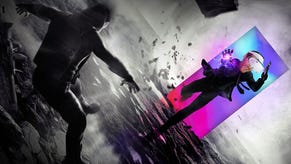Jennifer Hale and David Hayter on voice acting for VR, reuniting for Synapse, and Shrivelled Snake
Mind games.
Jennifer Hale and David Hayter are two of the most prolific voice actors in the industry today. Their careers span decades, with TV, film and video game credits to their names.
Last week, I sat down to chat with them both about their upcoming PSVR2 game, Synapse. This PSVR2 release will see the two actors working together once again (Hale was Naomi Hunter in the Metal Gear series, where Hayter of course played Solid Snake).
Synapse's action plays out in a twisted mindscape that combines firepower and telekinesis with a striking art style. Hayter plays Colonel Peter Conrad, a once-respected black ops leader gone rogue, while Hale plays handler Clara Sorensen. Clara guides players through the Colonel's mind, as you (a highly trained operative) are transported into his neuro-synaptic relay, in a bid to stop a devastating global attack.
While Hayter was unable to discuss plans for the upcoming MGS3 remake, the pair were able to talk at length on their characters past and present, the challenges of creating voices for off-screen characters in VR, and much more.
Can you give me a bit more background on your characters in Synapse?
Jennifer Hale: Clara is extremely goal oriented. She is determined to be successful at all costs. She's a dedicated operative and the Colonel is her number one goal in life - taking him down.
David Hayter [not missing a beat]: The Colonel is unjustly, unjustly persecuted by this person! Maybe that's just my opinion. He was a black ops specialist, at this point they feel that he's been driven insane by his career, brutality and deception. It's similar to Marlon Brando's character in Apocalypse Now, in that he's started disobeying orders and taking on missions without clearance.
He's become disillusioned with his commanders, particularly Clara. They've turned against him, and they call him an enemy of the state. They've hooked him up to this thing where they can access his brain, and they're sending soldiers in to dig stuff out. But because he's such a legendary soldier, he's using his abilities to throw everything he can at the player to destroy them in his mind before they can get to his secrets.
I love that it's all taking place in a mindscape.
Hayter: It's super cool. You know, they just came to me and asked me if I'd be interested in doing this character. I did another game with [developer] nDreams and I love how twisted and complex the characters are, and the fact this is actually taking place in this guy's mind is really, really awesome. It was a very cool experience and the gameplay looks awesome.
Hale: Because it's VR, it's in their minds, and you're not having cutscenes with us in the traditional way, you are just experiencing things through our eyes, through what we're seeing, through our voices. I really love that perspective.
There's clearly a dynamic between your two characters, but I know we don't actually get to see them in the game. What kind of guidance were you given for your performance?
Hale: Just draw on your extensive history...
Hayter: Of insanity? Yeah.
Hale: Both of them! Mutual insanity.
Hayter: Right? They're both a little crazy. The guidance was 'this guy's insane' essentially, and we are going to be living in his brain, and the rest comes through in the script. You know, the fact he's been through all these missions, he has a long military history. He's caused a lot of pain, he's endured a lot of pain.
All of that comes together to encircle the player and create the world that he lives in. It was pretty straight forward because the script was so clear.
Hale: Yeah. And the script was structured in that you start to get this sense that things are not always what they seem, which drives a level of curiosity and a level of discovery and a level of surprise. That is really fun, really exciting.
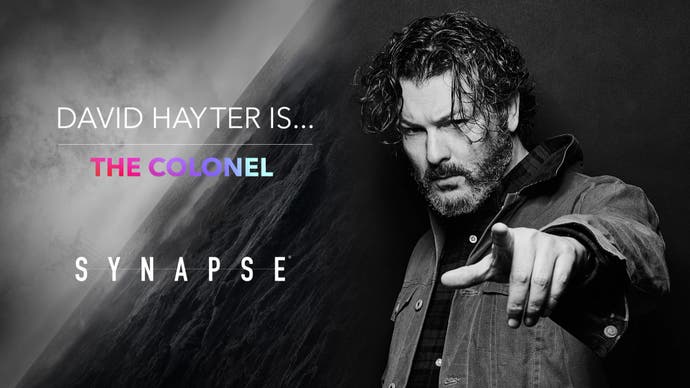
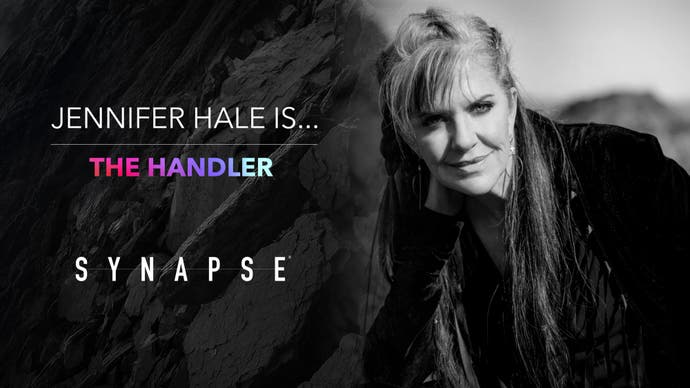
How do you as actors get the traits and personality of your characters through without actually being able to physically act out their quirks and attributes?
Hayter: Jennifer taught me to act physically while on the mic. You use your movements, you use your body, you use everything. So in terms of applying physical action to the lines, we're usually doing that.
Not being in the same room physically is a bit of a bummer. But that's the world we live in now - and we all record from all over the world. But usually, if you're recording individually, and Jennifer Hale is your counterpart, it's going to work out.
Hale: One of the things people don't always realise about voice acting is it's everything you're doing in say, an on-camera scene, plus. It's the same physicality... it's all those elements, except you have to physically restrain yourself so that your mouth does not leave a three-inch sort of cube right here [in front of the mic].
You don't have the luxury of physical movement, but you still have to convey physical movement. So you do silly things - or I do - like walking in place or, you know, stretching my arms or pacing in my head.
We have an additional imagination element that we have to add in, which is environment and proximity, and imagining the other person right then and what they've just said, in order to keep it as alive as we would if we were able to be in the same room doing a scene together and you know, in film or TV.
Hayter: There are a lot of specifics to it. But, it's so fun, especially when the project's good, you just disappear into it. It's the best job in the world, as far as I'm concerned.
.jpg?width=690&quality=75&format=jpg&auto=webp)
These roles in Synapse were written with you both in mind. Is that flattering, given that you're playing such a psychotic character, David? How do you feel about having this role made for you?
Hayter: You know, it's very funny, because when I came to Hollywood, I was 20 years old. And the only parts I ever got were heroes. I was Captain America, I was Solid Snake, I was the guy who does all these things. I auditioned for all sorts of things. But if it was a hero, or some sort of superhero, I typically got it. And I was so flattered by that. I was like, 'oh, that's yes, that's, that's absolutely as it should be'.
Then, after I turned 40, it was all villains. Something happens, I guess, you just turn evil. And you know, it's good to be bad. In a way, it's a lot more fun to play a damaged psychotic soldier than it is to play Captain America, who is pretty straightforward and always does the right thing.
But, with [Colonel Conrad], you just have no idea what he's gonna do. People familiar with my work will be surprised to hear me say this, but I really enjoy chewing the scenery. And I got to do a hell of a lot of that in this game. In some ways, it's desperately insulting. And in other ways, it's the greatest opportunity ever.
Hale: As someone who's known you for so long, I love it when people get to discover the actual possibilities you embody, because what you can do is phenomenal. Dave's range is wide and fantastic. I don't know if people realise how funny he is on top of everything else.
Hayter: Thank you, Jennifer Hale. High praise indeed from the greatest of all time. It's really lovely to hear.
Hale: I live to make him uncomfortable.
What were your character inspirations?Hayter: This is an exclusive, I haven't told anybody this. Because [the Colonel] had to be crazy, I thought I would take some Michael Keaton from the original Batman movie - 'You wanna get nuts? Come on! Let's get nuts!'. That sort of guy.
I didn't want him to sound too much like Solid Snake, I wanted him to have more of my voice. Where Snake is back here in the throat [does impression], I wanted to push it forward and be this sort of insane Michael Keaton-type character. So that was my great inspiration. Nobody plays fun and crazy like Michael Keaton.
Synapse has this roguelite structure to gameplay - do you have to approach this differently as a performer?
Hale: I don't alter, for myself, characters and performances based on that. My style and approach is always just to drop all the way down into whatever moment I'm occupying, because one of the things about working on a game is you're typically working out of sequence.
You might do this part of the timeline first, if you're lucky, and then you'll do something from the end and then you'll hop back to the middle and... you kind of have to be Dory [the fictional fish with short term memory loss which Hale voiced in certain tie-ins], and just thoroughly live in the moment.
Are you a Dory, David?
Hayter: There were some bits of dialogue indicating my character knew he was going through something again. So it's just a matter of trying to make sure that if there's any additional lines like that, you're giving a little bit of a different experience, so you're amping up the pressure. Like, 'you think you're gonna make it? You didn't make it last time... you know, you're fooling yourself, kid', that sort of thing.
And you're a constant companion/heckler along the way to the people trying to get at your secrets. But as Jennifer says, it doesn't really change too much. It's just a matter of knowing where you are in the story, even if you've been at the same place in the story before, and giving it a little different spin.
You are both respected in your craft, you've had some amazing roles in your career (and my daughter is very excited I am talking to Rivet right now [Hale as Rivet: "Tell her I say hi!"]). What is it you believe makes your voice so adaptable for so many different roles across so many different genres?
Hale: When I first moved to LA and started in this business, my work history was small market car commercials, it was corporate training films, it was film and television roles where I was cast very much like I appeared.
I wasn't even allowed to watch cartoons as a kid and I'd never played a game. When I got my first audition, it was for a cartoon series. And at that time, they would buy, you know, 57 or 64 episodes, and it was mind blowing. I was certain I was going to be fired every week. So I busted my butt in classes in learning to go beyond the three voices I had when I started, which was me, me younger, and a Valley Girl. That was it.
Hayter: I started with the same three!
Hale [in a Valley Girl voice]: Wait, Valley Girl, seriously?
Hayter [also in a Valley Girl voice]: Like, oh my God!
Hale: I've interviewed with a lot of casting directors and studios literally will say 'we need new blood, we need a new sound, we need new people'. So to keep working, I trained myself very specifically to be a utility player, which is somebody they can bring in and I can give them five, seven voices that are completely different in a single session.
You know, really, I did just want to pay my bills.
Hayter: It comes back to the word soul. My initial voices were me, younger me/excited me. And then, I could also do Russian for some reason. So these are how I start. In the industry, I played two Russians. This was my big break [all said in Russian accent].
I could do accents and stuff like that. The other thing I love about [voice acting] is, when you're on camera, you're just kind of you, your version of you and whatever. But if you're playing a two-foot tall British alien... nobody would ever cast me as that on camera, but you get to play these things in voiceover.
I think the real hook or the reason, not to speak for Jennifer, we have done well is - if you're talking about Solid Snake - Solid Snake could have just been a full on hard-ass soldier. You know, when Meryl [Solid Snake's Metal Gear love interest] gets shot, he could have been like this [does an impression of being gruff and slightly aloof]. But, it's like, 'no, it's Meryl'. He feels, he feels the pain of it, and he feels responsible for it.
If you can make the audience cry for this tough guy and for that stuff he's going through, and make the audience understand that he would take the tough guy route if he just didn't care so much about everybody around him. Like, he's such a softy, you know, beyond all the gruffness.
And that's what makes people attached to something like that. I also think that's the difference between the depths that we go to, to create an emotional bond with the player and not going to those depths.
Ideally, it's the same thing with Colonel Conrad. Even though he is essentially a psychopath who's trying to kill you, ideally, as you go through the story, you find out that he's a human being, and that there's more to it than you necessarily expected.
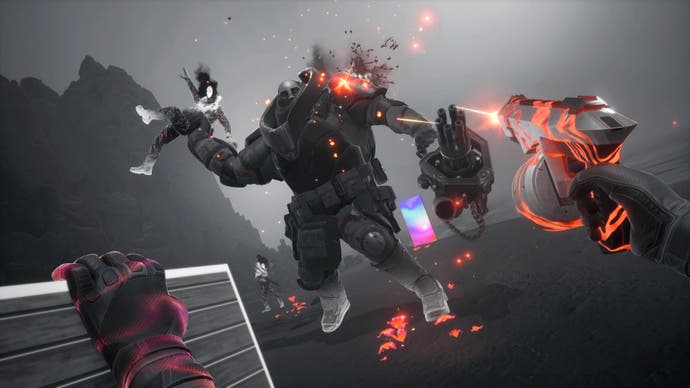
Are there any of your previous characters you'd like to return to specifically?
Hayter: All of them! People ask me all the time 'what was the most fun project to record?' and I'm like, I loved all of them.
I have as much fun on an under five alien role as I do doing nine months of Metal Gear or, you know... I played Lupin in a dub of Castle of Cagliostro, which is Hayao Miyazaki's debut feature. I'd love to play Lupin again.
There's just no bad day in the voiceover booth. It's better than doing anything else, frankly.
Obviously, Jennifer, you're known for lots of things, but Mass Effect, and FemShep - there is so much love for her. With Mass Effect Andromeda, there were audio logs, so even though the game was in the future, we heard past characters again. Is this something that you would consider returning to do in Mass Effect's future?
Hale: I would show up anywhere, anytime, to do anything involving Shepherd. And I can speak for Mark [Meer, the voice of MaleShep], and can say both of us would in a hot second. Yeah.
Is there anything from Shepherd or Snake's stories that you particularly loved? Or is there anything that you wish you could develop further?
Hale: I love saving the galaxy. Who doesn't want to do that?! And also, I always joke that Paragon is what I wish I was and Renegade's what I wish I could say. You know, being able to live in that, in that way... so frankly, you know, and not worried about what's happening. I mean, God, that was just, that whole thing, that was such an extraordinary experience.
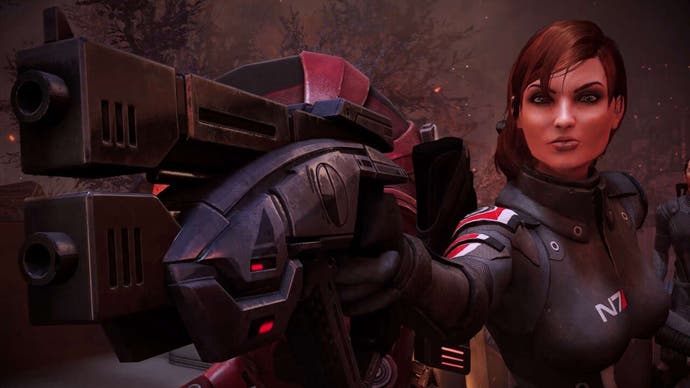
Are there any standout moments from Snake's history that you particularly look back on with fondness?
Hayter: Yes. In Metal Gear Four, Snake, poor poor Solid Snake, was suffering from accelerated ageing, and he was 35. But he looked like he was in his 70s and in the beginning of the game, he had to go be examined by Dr. Naomi. I think it was her fault he was ageing. I don't know, I blame everything on Dr Naomi.
So, the scene was Snake's gonna get examined by Dr. Naomi, she's going to examine his ageing body, and she asks him to take off his suit. And so he does and he strips down and the first thing Jennifer says is, 'oh, Snake' [in a rather pitying voice], and I'm like, 'Hey!', you know, just because I was just so offended. I'm like, you know, I still look pretty good.
And [Hale] jumps in and she goes [in the same pitying voice] 'so shrivelled'. And it nearly ended up on the voice track for the game because we record in English and then the tapes go back to Japan. And we realised they don't know when we're joking. And so Shrivelled Snake almost became a thing.
That's the next iteration!
Hayter: It's so funny when you're doing these things. You understand why somebody's written that, it's like 'oh my God, what a shock to see what's happened to Snake'. But, if you're Snake you are like: 'Hey! Come on man, it's not that bad, I'm still a human being'.
.png?width=690&quality=75&format=jpg&auto=webp)
.png?width=690&quality=75&format=jpg&auto=webp)
Synapse is due out on 4th July, exclusive to PlayStation VR2.
.jpg?width=690&quality=75&format=jpg&auto=webp)







